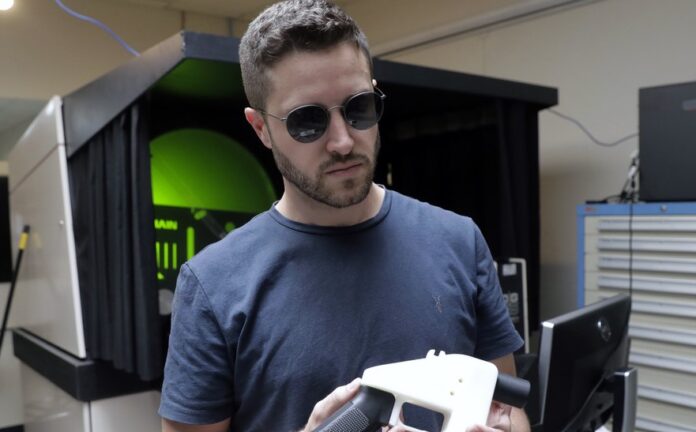There’s a moment in every antihero’s journey where the line between visionary and villain blurs, leaving the rest of us to argue over dinner whether this guy deserves a statue or a restraining order. Cody Wilson, the self-styled crypto-anarchist and founder of Defense Distributed, has made a career out of living in that uncomfortable space. If you’ve ever wondered what would happen if a tech bro discovered Nietzsche and weaponized your 3D printer, wonder no more.
Wilson, now 36, burst into the public consciousness in 2013, fresh off the release of his magnum opus, the Liberator—a fully functional, entirely 3D-printed pistol that was more symbol than weapon. “A gun you can’t take away,” he called it, leaning into a narrative of radical equality. For some, it was a poetic stand for liberty. For others, it was a dystopian nightmare.
Whatever your take, the Liberator’s plastic frame wasn’t just a gun. It was a provocation. And Wilson was ready to provoke.
The Making of a Crypto-Anarchist
Born in Little Rock, Arkansas, Wilson was the kind of kid who probably argued with teachers about the definition of “freedom.” He studied English at the University of Central Arkansas before heading to law school in Texas, where he reportedly realized that laws were less fun to follow than they were to dismantle. By 2012, he’d founded Defense Distributed, a non-profit organization dedicated to publishing open-source firearm designs—what he dubbed “wiki weapons.”
Wilson marketed himself as a freedom fighter, a man fighting against what he saw as the overreach of state power. His audience? Everyone from hardcore libertarians to gun enthusiasts to edgy teenagers on Reddit. His critics? The rest of humanity, particularly governments around the world scrambling to regulate a gun you could download like a Taylor Swift album.
A Blueprint for Chaos
Wilson’s provocations weren’t just limited to firearms. In 2014, he launched Ghost Gunner, a tabletop CNC mill capable of turning partially finished AR-15 receivers into fully functional firearms. If the Liberator was a digital age slingshot, Ghost Gunner was the bazooka.
Then there was Dark Wallet, his attempt to create an untraceable Bitcoin platform. And let’s not forget Hatreon, a crowdfunding site for individuals and groups too controversial even for platforms like Patreon. With every new project, Wilson seemed determined to push every button marked “Do Not Press.”
Critics called him reckless, a man who valued chaos over consequence. Wilson didn’t seem to care. “You can’t stop the signal,” he often said, quoting the sci-fi series Firefly. And for a while, he was right.
The Fall of an Antihero
But the signal dimmed in 2018, when Wilson’s personal life took a dark turn. Accused of paying a 16-year-old girl for sex, Wilson fled to Taiwan, where he was arrested and deported back to the United States. He pleaded guilty to a lesser charge, received probation, and completed community service. By 2022, his record was wiped clean, but his reputation wasn’t so lucky.
Wilson returned to Defense Distributed, but the world had changed. The gun control debate had grown more urgent, the internet more regulated. Wilson, once a media darling for libertarian fringe outlets, now kept a lower profile. Even Wired, which had once called him one of the most dangerous people on the internet, seemed less interested in his antics.
Freedom Fighter or Tech Grifter?
So, where does Cody Wilson fit in the cultural zeitgeist of 2025? He’s not in jail, but he’s not exactly free. The work of Defense Distributed continues, but the edge is dulled by the realities of regulation and public opinion. Some hail him as a modern-day Prometheus, giving the people firepower the gods would rather keep for themselves. Others see him as a man-child with too much access to technology and not enough sense to use it wisely.
Wilson himself seems unbothered by the debate. In interviews, he still speaks about freedom and equality as if he’s handing out candy. But listen closely, and you might catch a whiff of bitterness, the subtle frustration of a man who built a revolution only to find out revolutions have consequences.
The Final Question
Cody Wilson represents the best and worst of technological innovation. He’s a reminder that tools don’t have morals, but the people who use them do. Whether you see him as a hero or a harbinger, there’s one undeniable fact: Cody Wilson isn’t going anywhere. And neither are the ghost guns he helped unleash on the world.
The real question isn’t whether Cody Wilson will make his next move. It’s whether the rest of us are ready for it.
Disclaimer
This article is for informational and commentary purposes only. The views expressed within are those of the author and do not constitute legal, financial, or professional advice. All statements about Cody Wilson, Defense Distributed, and related activities are based on publicly available information at the time of publication and are not intended to defame, endorse, or malign any individual or organization.
The mention of legal cases, incidents, or allegations involving any parties is based on documented reports, and all individuals are presumed innocent until proven guilty in a court of law. References to 3D-printed firearms and related technologies are intended to provide context and are not a promotion or endorsement of illegal activities. Readers are encouraged to consult reliable sources and professional counsel for additional insights.
The publisher disclaims any responsibility for actions taken based on the information in this article.




